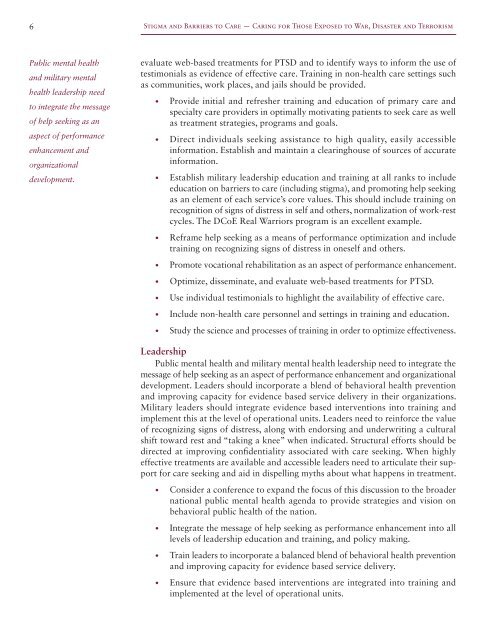stigma and barriers to care - Uniformed Services University of the ...
stigma and barriers to care - Uniformed Services University of the ...
stigma and barriers to care - Uniformed Services University of the ...
Create successful ePaper yourself
Turn your PDF publications into a flip-book with our unique Google optimized e-Paper software.
6<br />
Stigma <strong>and</strong> Barriers <strong>to</strong> Care — Caring for Those Exposed <strong>to</strong> War, Disaster <strong>and</strong> Terrorism<br />
Public mental health<br />
<strong>and</strong> military mental<br />
health leadership need<br />
<strong>to</strong> integrate <strong>the</strong> message<br />
<strong>of</strong> help seeking as an<br />
aspect <strong>of</strong> performance<br />
enhancement <strong>and</strong><br />
organizational<br />
development.<br />
evaluate web-based treatments for PTSD <strong>and</strong> <strong>to</strong> identify ways <strong>to</strong> inform <strong>the</strong> use <strong>of</strong><br />
testimonials as evidence <strong>of</strong> effective <strong>care</strong>. Training in non-health <strong>care</strong> settings such<br />
as communities, work places, <strong>and</strong> jails should be provided.<br />
••<br />
Provide initial <strong>and</strong> refresher training <strong>and</strong> education <strong>of</strong> primary <strong>care</strong> <strong>and</strong><br />
specialty <strong>care</strong> providers in optimally motivating patients <strong>to</strong> seek <strong>care</strong> as well<br />
as treatment strategies, programs <strong>and</strong> goals.<br />
••<br />
Direct individuals seeking assistance <strong>to</strong> high quality, easily accessible<br />
information. Establish <strong>and</strong> maintain a clearinghouse <strong>of</strong> sources <strong>of</strong> accurate<br />
information.<br />
••<br />
Establish military leadership education <strong>and</strong> training at all ranks <strong>to</strong> include<br />
education on <strong>barriers</strong> <strong>to</strong> <strong>care</strong> (including <strong>stigma</strong>), <strong>and</strong> promoting help seeking<br />
as an element <strong>of</strong> each service’s core values. This should include training on<br />
recognition <strong>of</strong> signs <strong>of</strong> distress in self <strong>and</strong> o<strong>the</strong>rs, normalization <strong>of</strong> work-rest<br />
cycles. The DCoE Real Warriors program is an excellent example.<br />
••<br />
Reframe help seeking as a means <strong>of</strong> performance optimization <strong>and</strong> include<br />
training on recognizing signs <strong>of</strong> distress in oneself <strong>and</strong> o<strong>the</strong>rs.<br />
••<br />
Promote vocational rehabilitation as an aspect <strong>of</strong> performance enhancement.<br />
••<br />
Optimize, disseminate, <strong>and</strong> evaluate web-based treatments for PTSD.<br />
••<br />
Use individual testimonials <strong>to</strong> highlight <strong>the</strong> availability <strong>of</strong> effective <strong>care</strong>.<br />
••<br />
Include non-health <strong>care</strong> personnel <strong>and</strong> settings in training <strong>and</strong> education.<br />
••<br />
Study <strong>the</strong> science <strong>and</strong> processes <strong>of</strong> training in order <strong>to</strong> optimize effectiveness.<br />
Leadership<br />
Public mental health <strong>and</strong> military mental health leadership need <strong>to</strong> integrate <strong>the</strong><br />
message <strong>of</strong> help seeking as an aspect <strong>of</strong> performance enhancement <strong>and</strong> organizational<br />
development. Leaders should incorporate a blend <strong>of</strong> behavioral health prevention<br />
<strong>and</strong> improving capacity for evidence based service delivery in <strong>the</strong>ir organizations.<br />
Military leaders should integrate evidence based interventions in<strong>to</strong> training <strong>and</strong><br />
implement this at <strong>the</strong> level <strong>of</strong> operational units. Leaders need <strong>to</strong> reinforce <strong>the</strong> value<br />
<strong>of</strong> recognizing signs <strong>of</strong> distress, along with endorsing <strong>and</strong> underwriting a cultural<br />
shift <strong>to</strong>ward rest <strong>and</strong> “taking a knee” when indicated. Structural efforts should be<br />
directed at improving confidentiality associated with <strong>care</strong> seeking. When highly<br />
effective treatments are available <strong>and</strong> accessible leaders need <strong>to</strong> articulate <strong>the</strong>ir support<br />
for <strong>care</strong> seeking <strong>and</strong> aid in dispelling myths about what happens in treatment.<br />
••<br />
Consider a conference <strong>to</strong> exp<strong>and</strong> <strong>the</strong> focus <strong>of</strong> this discussion <strong>to</strong> <strong>the</strong> broader<br />
national public mental health agenda <strong>to</strong> provide strategies <strong>and</strong> vision on<br />
behavioral public health <strong>of</strong> <strong>the</strong> nation.<br />
••<br />
Integrate <strong>the</strong> message <strong>of</strong> help seeking as performance enhancement in<strong>to</strong> all<br />
levels <strong>of</strong> leadership education <strong>and</strong> training, <strong>and</strong> policy making.<br />
••<br />
Train leaders <strong>to</strong> incorporate a balanced blend <strong>of</strong> behavioral health prevention<br />
<strong>and</strong> improving capacity for evidence based service delivery.<br />
••<br />
Ensure that evidence based interventions are integrated in<strong>to</strong> training <strong>and</strong><br />
implemented at <strong>the</strong> level <strong>of</strong> operational units.




